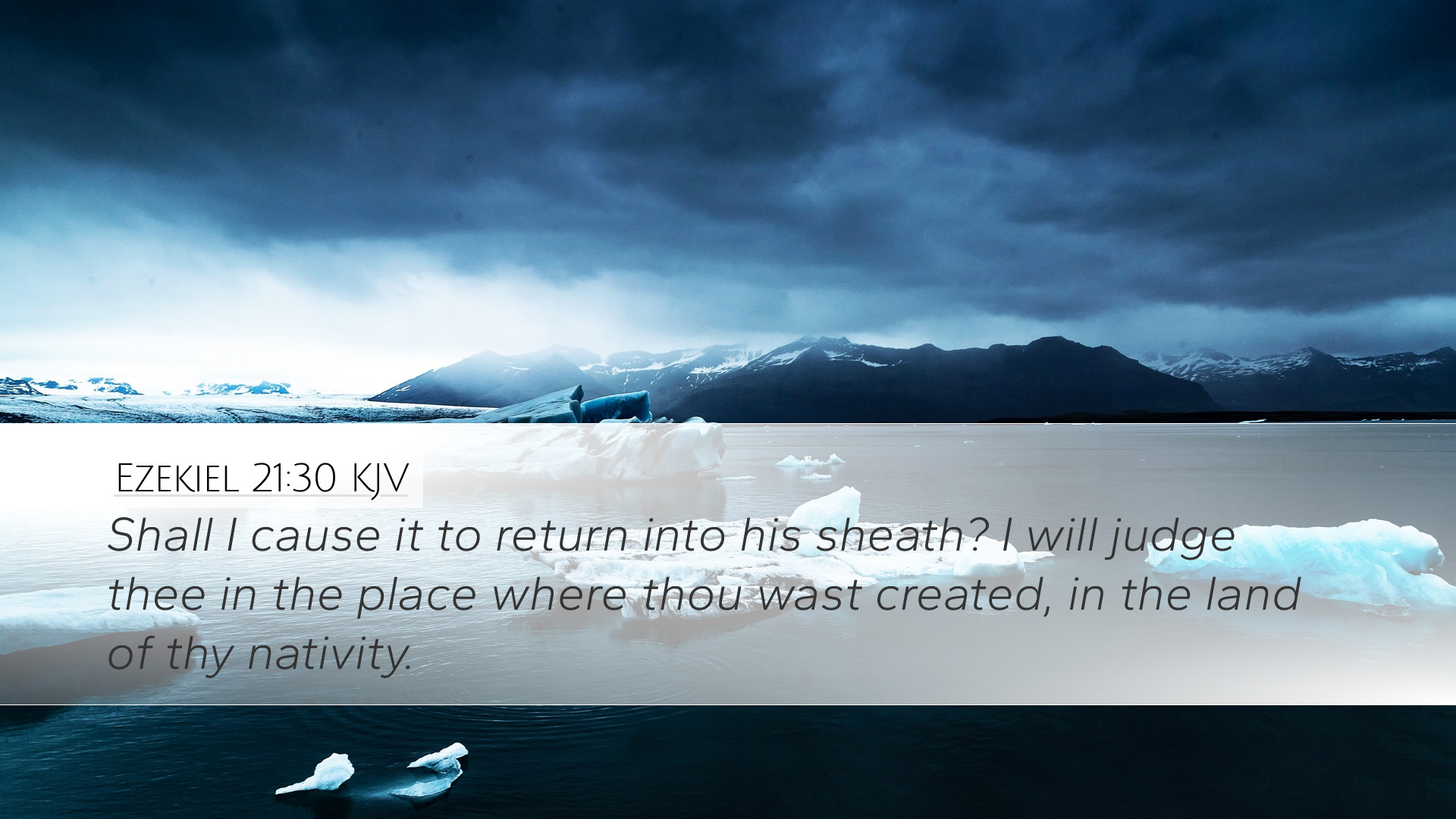Commentary on Ezekiel 21:30
Ezekiel 21:30: "Shall I cause it to return into his sheath? Shall I call it back from the sword, the sword of the slain; it shall not return anymore?"
Contextual Overview
This verse is part of Ezekiel's prophecy regarding the impending judgment upon Jerusalem and the nation of Israel. It is imperative to understand the historical and theological context that frames this proclamation. Ezekiel is addressing a time of crisis, highlighting the desperate state of the people who are facing divine retribution for their sins. The imagery of the sword is vivid and powerful—representing both judgment and the irrevocable nature of God's decree.
Key Themes
- Divine Judgment: The sword symbolizes God’s judgment and the inevitable consequence of Israel’s disobedience and idolatry.
- Irrevocability of God's Word: This verse illustrates the idea that God's proclamations are final, underscoring the seriousness of His messages as delivered through the prophet.
- Hope and Despair: In this proclamation, there is a duality of despair for those facing judgment and a glimmer of hope for future restoration after purification.
Commentary Insights
Matthew Henry
Matthew Henry emphasizes the theme of divine sovereignty in this verse. He remarks on how the metaphor of the sword suggests that the judgment is not merely military defeat but a manifestation of God’s direct action against sin. He notes, "The sword is drawn, and it is only the hand of God that could sheathe it again." This alludes to the notion that the calamities befalling the people are not accidental but are part of a divine plan aimed at correction and discipline.
Albert Barnes
Albert Barnes provides a detailed analysis of the imagery of returning the sword to its sheath. He explains that the act of sheathing the sword represents a cessation of conflict and signifies mercy. However, Barnes points out that in this instance, the sword shall not be sheathed, emphasizing the certainty of judgment: "The decision is made; the people will not escape their fate. They must face the consequences of their actions." This highlights the urgency of repentance and the reality of divine justice.
Adam Clarke
Adam Clarke draws attention to the interpretive implications of the verse, suggesting that the sword represents both the physical destruction by enemies and the spiritual implications of separation from God. He explains, "The refusal to sheathe the sword indicates a withdrawal of divine protection." This is a poignant reminder that disobedience leads to spiritual and physical consequences, marking the seriousness with which God approaches sin and the call to His people to return to His ways.
Theological Implications
The deeper theological implications of Ezekiel 21:30 reveal the interplay between God's justice and mercy. The irrevocable nature of God's word acts as a solemn reminder of the results of unrepentant sin. It challenges readers to consider the nature of divine judgment and the grace that may follow after repentance.
Judgment as a Path to Restoration
This passage encourages contemplation on how judgment is necessary for restoration. The sword may represent a painful but necessary process leading to eventual healing and renewal. As reflected in other prophetic literature, this duality underscores God’s character as both just and loving.
Conclusion
In summation, Ezekiel 21:30 serves as a poignant reminder of the unwavering proclamations of God regarding judgment and the deep implications of human choices. Through the insights of respected commentators such as Matthew Henry, Albert Barnes, and Adam Clarke, we glean profound truths about the nature of God’s justice. It beckons believers and students of Scripture to embrace the lessons within it—acknowledging God's authority, the weight of sin, and the hope found in genuine repentance.


